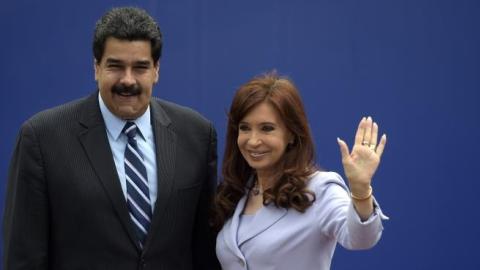Argentine president Cristina Fernandez de Kirchner and Venezuelan leader, Nicolas Maduro, have much more in common than failing economies, populist rhetoric, and a penchant for extra-judicial political maneuvers: they are both the first and second (respectively) highest recipients of Chinese lending in Latin America—a region that, between 2005 and 2013 has received more than $100 billion in loan commitments from Beijing. As China’s economy begins to slow, however, both leaders may find another commonality to add to the list: tattered political careers.
To date, China has lent Venezuela more than $50 billion, ostensibly for infrastructure, mining, and energy projects. (Maduro is notoriously vague on where bolivar notes end up.) With OPEC in the midst of an oil war with the United States, China's loan to Venezuela—repayable in oil—is suddenly becoming exceedingly difficult to pay back. This explains—paradoxically—why Maduro was able, during a recent visit to Beijing, to secure $20 billion in “investments” from the Chinese. Quite simply, China has financed too much to risk a Venezuelan implosion, which, with inflation rates at 64%, an economy that contracted by 2.8% in 2014, oil trading under $50 a barrel, and commodity shortages throughout the country, seems increasingly likely. In what appeared to be a last-ditch effort to revive a flagging economy, Venezuela announced this past Tuesday the creation of a new foreign-exchange market called the “Marginal Foreign-Exchange System” (or, Simadi), allowing for a free-floating exchange rate. 24 hours later, the market responded, with Venezuelan dollar-denominated bonds tumbling
China is doubtless keeping close eye on these developments and is certainly less likely to agree with an increasingly desperate Maduro that “God will provide.”
Second in line for Chinese loans is Argentina, which has received over $14 billion since 2007, the majority of which has gone to transportation and energy projects like China also happens to be Argentina’s second largest trading partner after Brazil, and recently signed 22 economic cooperation deals with the country. Overlooking some tone-deaf tweets from Kirchner last week, relations between the two appear as strong as ever. And yet, Kirchner’s latest trip to Beijing, like Maduro’s, resulted in more “investments” from Beijing—no cash. (Financial figures where not disclosed.)
Argentina’s social and economic turmoil at home mirror the domestic problems in Venezuela. Kirchner has recently been the target of some not-so-subtle allegations regarding her involvement in the murder of Alberto Nisman, the federal prosecutor in charge of investigating the 1994 car bombing of a Buenos Aires Jewish center that killed 85 people. Four days before his death, Nisman had filed a report accusing the Argentine government of covering up Tehran’s role in the bombing in exchange for—you guessed it—economic favors. It is looking increasingly likely that Kirchner will face formal charges for her alleged involvement. Coupled with recent failures to pay back interest holders of Argentina’s defaulted debt, an outright refusal to pay initial creditors, and, again like Venezuela, commodity shortages, Beijing has little reason to feel confidence Buenos Aires.
A recent editorial in The Buenos Aires Herald warned of the negative impacts Kirchner’s pro-Sino policies might have once China’s economy begins to slow. With a Washington relationship characterized last year by U.S. Assistant Secretary of State for Western Hemisphere Affairs Roberta Jacobson as “in a difficult period”, Argentina may soon discover why mocking China is not so funny
Venezuela and Argentina are just among the most conspicuous examples of Latin American countries on the Chinese doll. Beijing, playing host to the Leaders of the Community of Latin American and Caribbean States (CELAC) last month, promised investments of over $250 billion in the region over the next ten years, with bilateral trade agreements potentially reaching over $500 billion.
President Xi Jinping described the effect of the CELAC proceedings as “give[ing] the world a positive signal about deepening cooperation between China and Latin America and have [ing] an important and far-reaching impact on promoting South-South cooperation and prosperity for the world."
And yet, as we have seen with Venezuela and Argentina, the details of this “South-South” cooperation matter a great deal. First, infrastructure “investments” are not the same thing as cash infusions—something many of these ailing economies in Latin America desperately need. There is cruel irony in Argentina securing billions in investments for hydroelectric dams and strategic transportation projects when necessary feminine-care products run scarce. Second, when investments are made, the Chinese expect returns. Though its balance sheet is too opaque to sustain honest evaluation, it does not take an economics graduate from the Universidad Central de Venezuela to understand where the oil profits for the next few decades are going. Sadly, any pitfalls of less-than-transparent deals cut by both the Maduro and Kirchner regimes may not be seen for years to come. Finally, promises can be pared down or even rescinded as the global economy fluctuates.
It has become a recent trope for Latin America-watchers to describe China’s economic hegemony in the region as a new Monroe Doctrine. It remains to be seen, however, how hard China is willing to fight to retain its dominance and what this dominance really amounts to.















